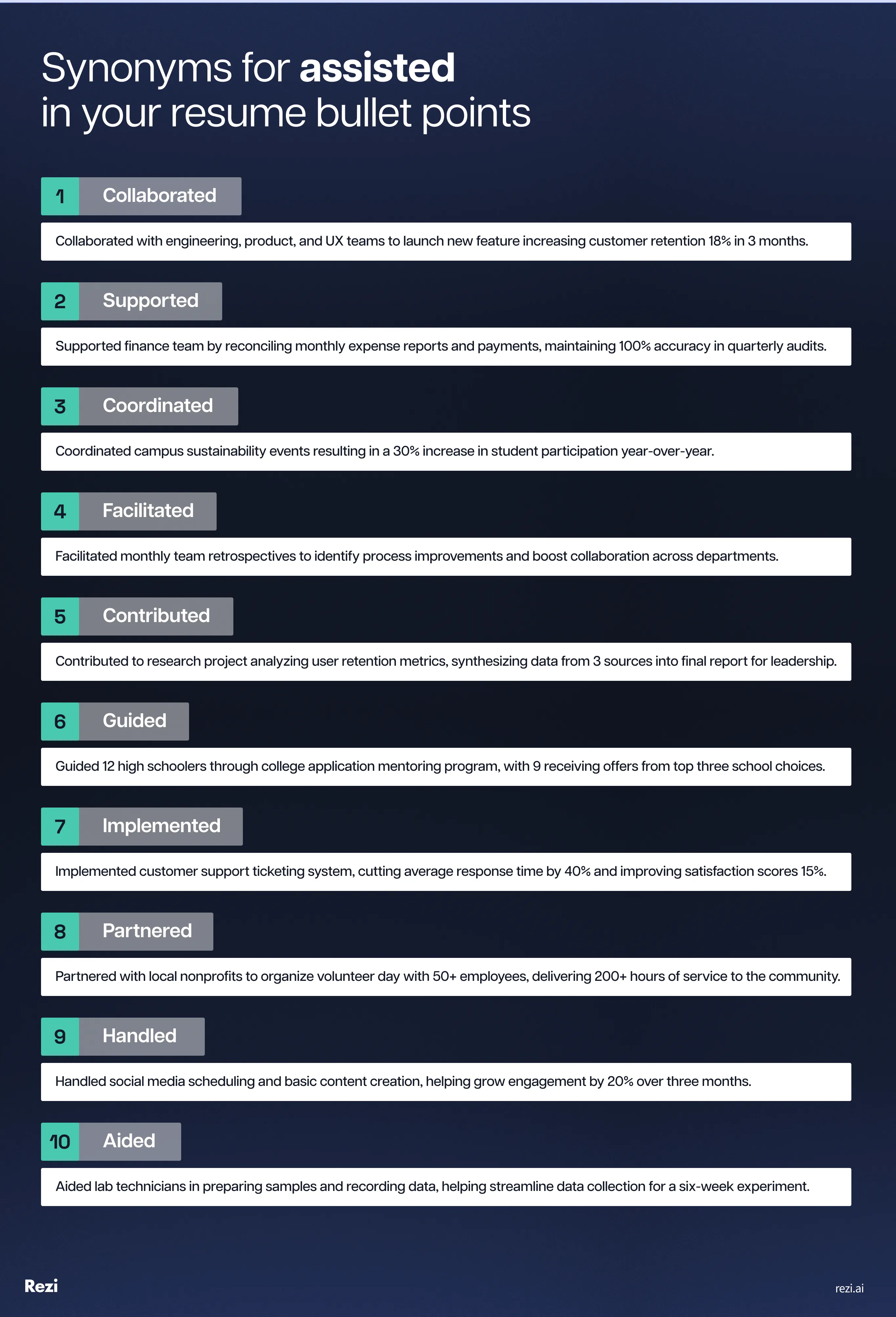Tired of overusing “assisted” on your resume? This guide offers 30+ stronger synonyms, real examples, and tips to better highlight your impact.



“Assisted” is one of those go-to words people use on resumes to show they helped out, supported a team, or played a role in getting things done. And while it’s clear and professional, relying on it too much can make your experience sound a little bland.
If you want to add variety to your language and really emphasize your contributions, this guide is here to help. You’ll find:
- Stronger, more specific alternatives to “assisted.”
- Resume-ready examples for each synonym.
- Tips on when “assisted” is actually the word to use.
Want to save time? Try the Rezi AI Resume Builder for instantly polished, varied phrasing. For more tips on fine-tuning your wording, check out:
- Top 30 Resume Buzzwords to Avoid
- How to Describe Good Work Ethic on a Resume
- ATS Resume Keyword Examples
- How to Write a Resume Faster
30+ Resume Synonyms for “Assisted”
Resumes are (mostly) just one page to show employers why you’re the right person for the job, so every word counts. Using a variety of strong, specific verbs helps you stand out and highlights the full scope of what you’ve done.
Below is a list of perfect alternatives for “assisted” on your resume:
And here’s how you can use them in real resume bullet points:

How to Replace “Assisted” With Synonyms on Your Resume
If you’ve typed “assisted” so many times it feels like your resume needs a little assistance of its own, you’re in the right place. We’ll walk you through how to upgrade basic “assisted” bullet points with stronger, more specific verbs, and explain why the yassified version hits harder with hiring managers.
Supported vs. Assisted
“Supported” highlights your active role in solving problems. It sounds more proactive than “assisted” and suggests you were hands-on in identifying and responding to customer needs.
“Assisted in resolving customer service issues.”
“Supported resolution of customer service issues by identifying trends and collaborating with senior reps to improve response workflows.”
Collaborated vs. Assisted
“Collaborated” emphasizes teamwork and partnership. It tells employers you weren’t just following instructions, you worked closely with others, shared ideas, and helped drive results together.
“Assisted the marketing team on campaign launches.”
“Collaborated with the marketing team to launch two cross-channel campaigns that increased engagement by 20%.”
Aided vs. Assisted
“Aided” is a direct synonym, but it feels a little more intentional and formal. It works well when you want to highlight structured involvement in a process like recruiting or training.
“Assisted the HR manager with recruiting tasks.”
“Aided recruiting workflows by screening resumes, coordinating interviews, and preparing onboarding materials.”
Contributed vs. Assisted
Instead of sounding like you were just helping, “contributed” frames you as someone who added real value. It puts the focus on what you brought to the table.
“Assisted the finance department during audits.”
“Contributed to audit preparation by organizing key financial documentation and ensuring compliance with internal protocols.”
Helped vs. Assisted
“Helped” is clear and approachable, but pairing it with a concrete outcome (like creating presentations) makes the sentence more useful and results-focused.
“Assisted in preparing presentation materials.”
“Helped develop executive-facing presentation decks by gathering key metrics and designing slide visuals.”
Handled vs. Assisted
“Handled” shows ownership. It tells the recruiter you weren’t just helping — you were responsible for getting the task done accurately and on time.
“Assisted with data entry for monthly reports.”
“Handled data entry for monthly financial reports with 100% accuracy, improving turnaround time for leadership review.”
Coordinated vs. Assisted
The use of “coordinated” suggests you took charge of logistics and communication. It sounds more organized and leadership-driven rather than just being involved.
“Assisted in organizing team meetings.”
“Coordinated weekly meetings, drafted agendas, and tracked follow-up actions for a 15-person team.”
Guided vs. Assisted
“Guided” highlights mentorship and responsibility. It’s a great word if you had a role in helping others learn or succeed, especially in training or onboarding contexts.
“Assisted in onboarding new employees.”
“Guided five new hires through onboarding by leading walkthroughs, answering questions, and sharing best practices.”
Partnered vs. Assisted
Instead of sounding like a sidekick, “partnered” positions you as an equal contributor. It emphasizes that you worked closely with others to create something together.
“Assisted the design team on client projects.”
“Partnered with designers to brainstorm visuals and refine assets for three high-profile client presentations.”
Participated vs. Assisted
A good choice when you want to show involvement without overinflating your role. “Participated” communicates active engagement in team efforts or group projects.
“Assisted with customer outreach efforts.”
“Participated in outreach by sending follow-ups and logging communications in the CRM.”
Monitored vs. Assisted
“Monitored” points to responsibility and attention to detail. It suggests you were keeping a close eye on progress and making sure things stayed on track.
“Assisted in managing project deadlines.”
“Monitored project timelines and updated tracking tools to keep deliverables on schedule.”
Scheduled vs. Assisted
“Scheduled” makes the task sound concrete and measurable. It tells the hiring manager you handled logistics and timing, and pairing it with tools or platforms hints at your technical knowledge.
“Assisted with social media posts.”
“Scheduled content using Buffer and aligned post timing with campaign goals, leading to a 15% increase in engagement.”
Implemented vs. Assisted
By saying you “implemented” something, you’re demonstrating action and follow-through. It implies technical skill or the ability to put plans into motion.
“Assisted with website updates.”
“Implemented updates through the CMS to refresh outdated pages and improve site navigation.”
Composed vs. Assisted
Instead of just being part of the writing process, “composed” makes it clear you were responsible for writing or shaping the message. It’s a stronger choice when your work involved communication or content creation.
“Assisted in writing internal newsletters.”
“Composed sections of the monthly internal newsletter, highlighting team wins and project updates.”
Facilitated vs. Assisted
“Facilitated” suggests leadership and initiative. It tells the employer you were running the show, creating structure, and helping others succeed.
“Assisted in team training sessions.”
“Facilitated training workshops for new hires, streamlining onboarding and reducing ramp-up time by 25%.”
Need help with your other bullet points? Give the AI Bullet Point Editor a try — it makes writing clear, polished resume lines a whole lot easier.
Best “Assisted” Synonym Examples
You’ve probably used “assisted” on your resume before, and there’s nothing wrong with that. But if you want to sound more confident, show a bit more initiative, or just stop repeating the same word in every bullet point, switching it up can make a big difference.
Here are some of the best alternatives to “assisted”:
1. Collaborated
“Collaborated” is perfect when you want to highlight that you worked closely with others to get things done. It implies active teamwork, communication, and contribution — all without overstating your role. Best for marketing, design, product development, tech, or any cross-functional environment.
Examples:
• Collaborated with designers and developers to launch a mobile app used by 10,000+ customers.
• Collaborated with the sales team to create client-facing materials that improved close rates by 12%.
• In my final year, I collaborated with classmates to organize a sustainability fair that drew over 500 attendees.
For a deeper dive on emphasizing your collaboration, check out How to Write Teamwork Skills on a Resume.
2. Supported
“Supported” is versatile — it shows you had someone’s back and contributed meaningfully, without needing to be in charge. It demonstrates reliability, teamwork, and initiative in a more behind-the-scenes role. It’s clear, humble, and professional. A great fit for admin, customer service, HR, operations, healthcare, and early-career roles.
Examples:
• Supported daily operations by managing calendars and prepping reports for senior management.
• Supported the HR team during recruitment season, scheduling over 60 interviews.
• Supported peer tutoring sessions for first-year students in computer science.
3. Coordinated
“Coordinated” signals that you were the one keeping things moving — scheduling, planning, and organizing. It suggests ownership, attention to detail, and strong communication. Use this when you want to emphasize your ability to keep processes and people aligned. Best for project management, admin, events, operations, and comms roles.
Examples:
• Coordinated internal communications and weekly meetings for a 20-person marketing team.
• Coordinated logistics for three off-site client meetings, including travel and presentation materials.
• As event chair, I coordinated fundraising events that brought in over $5,000 for local nonprofits.
4. Facilitated
“Facilitated” has a polished, leadership-adjacent tone. It means you helped things run smoothly, whether that’s a meeting, training, or process. It shows initiative, communication, and an ability to make things easier. Great for education, consulting, management, and people-facing roles.
Examples:
• Facilitated weekly knowledge-sharing sessions among customer support reps, improving issue resolution speed by 18% over three months.
• Facilitated cross-functional meetings to align product, marketing, and engineering priorities.
• Facilitated small group discussions in peer-led workshops on digital literacy.
5. Contributed
“Contributed” works well when you played a meaningful role without leading. It conveys that your input mattered and that you were actively involved. It’s a humble yet effective way to show your value, especially when paired with results. Ideal for creative, research, technical, or team-based roles.
Examples:
• Contributed to UX research by conducting user interviews and organizing findings into actionable insights.
• Contributed to brand strategy development by gathering competitive intelligence and market trends.
• Contributed to a student-led initiative to promote mental health awareness on campus.
6. Guided
“Guided” is a strong, people-oriented verb that indicates you provided direction, mentorship, or support. It suggests leadership and trust, even if you weren’t in a formal management role. Perfect for education, training, customer success, or any role where helping others succeed was part of your job.
Examples:
• Guided over 50 clients through the loan application process, ensuring compliance and improving approval rates by 15%.
• Mentored and guided junior interns through their first client presentations.
• During university, I guided visiting students during campus tours and orientation sessions.
Curious about leadership styles? Read 10+ Leadership Styles & How to Choose the Best One for You.
7. Implemented
“Implemented” means you turned plans into action. It demonstrates follow-through, problem-solving, and ownership. It works especially well in tech, operations, admin, or process-heavy roles — anywhere execution is just as important as ideas.
Examples:
• Implemented a new invoicing system that reduced processing time by 40%.
• Implemented weekly check-ins to improve team accountability and communication.
• Implemented social media content updates to boost post reach by 15%.
8. Partnered
“Partnered” is all about collaboration with a sense of equality, not just helping, but actively contributing alongside someone else. It points to initiative, trust, and teamwork. Best for cross-functional teams, client-facing work, or creative and strategic roles.
Examples:
• Partnered with external vendors to oversee event logistics and ensure on-time delivery of all promotional materials.
• Partnered with engineering and product teams to launch three feature updates.
• Partnered with local organizations to coordinate volunteer efforts and build community connections.
9. Handled
“Handled” is simple but powerful. It shows that you were trusted to take care of something independently. It implies ownership, follow-through, and reliability. Ideal for admin, finance, customer service, and roles where responsibility and day-to-day execution are key.
Examples:
• Handled daily scheduling and email communications for a 10-person team.
• Handled customer escalations with professionalism, resolving 95% without needing supervisor input.
• Handled inventory tracking and supply ordering for campus events.
10. Aided
“Aided” is a polished, no-nonsense alternative to “assisted.” It sounds intentional and clear, while still staying humble. It’s great for research, healthcare, education, or legal environments where support roles are crucial. This word works when you want to emphasize your helpfulness without over-claiming.
Examples:
• Aided legal team in preparing case files and organizing court documents.
• Aided research staff by compiling datasets and assisting with data entry and analysis.
• Aided first-year students in acclimating to campus life through peer mentorship.
When You Should Still Use “Assisted” in Your Resume
“Assisted” isn’t a bad word — promise. Sometimes it’s exactly the right word to use. The key is knowing when it works best and when a stronger synonym might better reflect your impact. This section will help you figure out when to stick with “assisted,” when to switch it up, and how to make every bullet point count.
- Use “assisted” and its synonyms in your experience section. It can show how you pitched in, supported teams, or played a hands-on role — even if you weren’t in charge. These verbs let you show impact without exaggerating your responsibilities.
- Stick with “assisted” when you truly played a supporting role. It’s honest and clear. But if you led, owned, or drove something forward, go with a more active verb so your contribution gets the credit it deserves.
- Avoid starting every bullet with “assisted.” If all your bullets sound the same, it gets repetitive fast. Mix in stronger verbs like “supported,” “collaborated,” or “contributed” to keep things engaging and specific.
- Pick verbs that match what you actually did. “Partnered” feels collaborative, “implemented” shows action, and “guided” suggests leadership. The right word gives hiring managers a sharper sense of your role.
- Skip “assisted” in your resume summary section. That space is for bold, high-impact statements — go for verbs like “led,” “delivered,” or “contributed” that show what you bring to the table.
- If you’ve held leadership roles, steer clear of passive verbs. Saying you “assisted with planning” as a team lead can downplay your authority. Use words like “developed,” “oversaw,” or “executed” instead.
- Using synonyms adds range to your resume. Even if your roles were similar, varying your language helps show off different strengths and keeps your resume from sounding stale.
- Pair your verb with clear outcomes. “Assisted” is just the start — follow with what you did and what changed because of it. That’s what makes a bullet point land. (Learn more in How to Show Achievements on a Resume.)
- Use these verbs for extracurriculars and education sections. Whether you supported a club or helped lead a project, it’s still experience — and the right words can prove the effort and teamwork behind it, paid or not.
FAQ
What is a better way to say assisted with?
Instead of saying “assisted with,” try verbs that are more specific to what you did. For example, “supported,” “coordinated,” “contributed to,” or “handled” can all work depending on the task. These words help show your exact role and make your resume sound more active and intentional. “Assisted with onboarding” could become “guided new hires through onboarding,” which gives a clearer picture of your contribution.
What is the best synonym for assistance?
The best synonym for “assistance” really depends on the context, but “support” is often a strong, clear alternative. It sounds professional, and it works across industries — from customer service to tech. “Help,” “guidance,” and “aid” can also work, but “support” usually hits that sweet spot of being both active and polished, especially on resumes or in cover letters.
How do you say you assisted customers on a resume?
Be specific about the support you provided. Instead of “assisted customers,” say something like “resolved customer inquiries,” “supported clients through onboarding,” or “guided users through technical issues.” These phrases highlight your problem-solving and communication skills — two things hiring managers love to see.
Want more ideas? Check out 20+ Top Customer Service Skills to Put on a Resume.
What are strong verbs for a resume?
Strong resume verbs make your impact clear. Use words like “led,” “developed,” “managed,” “created,” “implemented,” “coordinated,” “optimized,” and “delivered.” These emphasize action, ownership, and results.
Which verbs should not be on your resume?
Try to avoid vague or weak verbs on your resume, like “helped,” “worked on,” “responsible for,” or “involved in.” They don’t show enough ownership or impact. For example, saying “worked on a team project” doesn’t tell us what you did. Instead, say what role you played — did you lead, organize, coordinate, or execute? The more specific, the better.



